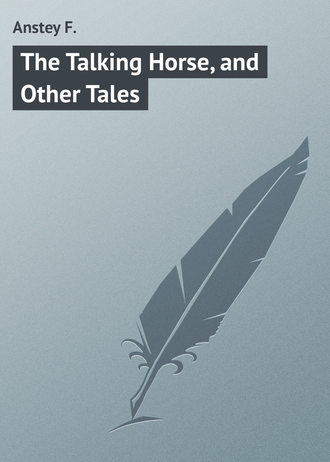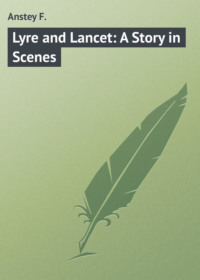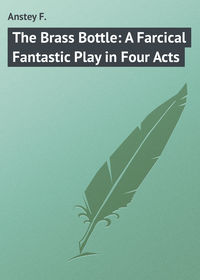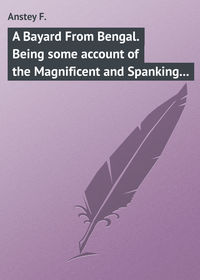 полная версия
полная версияThe Talking Horse, and Other Tales
To do Clarence justice, they were not due to any elation on his part, but had all been executed by the army in the wild hope that they might thus stir up the foe to a fresh demonstration, when they themselves might recover their lost spurs.
These placards, as Clarence found on reaching the stockade, had been scrawled over with a kind of red and yellow paint so as to be quite illegible.
'Ochre,' said Guy; 'but that's not the best of it, for we found this pinned with an arrow to one of the posts.' And he produced a thin strip of white bark, on which were writing and drawings in crimson. 'They must have done it with their own blood,' commented Jack, with great gusto; 'but read it – do read it.'
Clarence did not need a second invitation to read the document, which was as follows: —
'Wah Na Sa Pash Boo (Yellow Vulture), Chief of Black Bogallala Tribe, to the Great White Chief, Tin Lin, Defiance'The wigwam of Yellow Vulture wants but one ornament – the scalp of the white chief. Yellow Vulture has seen the taunts calling the red warriors "women with the hearts of deer." He will show the Paleface that the anger of the dusky ones is a big heap-lot terrible. When the sun has set behind the hills, and the stars light their watch-fires, then will Yellow Vulture and his braves be at hand. The scalp of the Paleface shall adorn the tepee of the Red Man.
'Wah-Wah!'In order that there should be no possible mistake about the intention, the message was supplemented by a rude representation of the process of scalping, evidently the work of a practised hand.
'Didn't I tell you we had something jolly to show you!' exclaimed Jack.
But joy, or some equally powerful emotion, rendered the General incapable of speaking for several moments.
ACT THE THIRD
WHERE IS THE GENERAL?
It was some little time before Clarence Tinling gave any opinion upon this bloodthirsty document. He turned exceedingly red, and examined it suspiciously on both sides. It seemed as if he did not altogether welcome this second opportunity for distinguishing himself. When he spoke it was with a sort of angry anxiety.
'You think yourselves very clever, I dare say,' he said; 'but you needn't fancy you'll take me in! Come, you had better say so at once – you did this yourselves? It is not half bad – I will say that for it.'
'That we didn't,' cried Guy. 'Why, just look at it, Tinling. Any one could see that it's an Indian's doing. No, it's all right; they really are coming.'
'It's all skittles, I tell you,' said Clarence, still more angrily, though he was paler again now. 'What should Indians come here for?'
'Well, he says why, there,' said Jack, 'and they came the other evening.'
Clarence's colour rose again. 'That's different,' he said; 'I mean, it's not the same tribe.'
'No, these are Black Bogallalas,' said Jack. 'What were the first ones, Tinling?'
'I didn't ask them,' said the General shortly.
'How many braves should you think Wah Na What's-his-name will bring?' asked Guy. 'As many as came the other evening? How many did come the first time?'
'Do you think I had nothing better to do than count?' he retorted. 'Is there anything else you would like to know?'
'Well, we'll hang out the lantern to-night, and watch how many come inside its rays,' said Jack, with a briskness which displeased his chief.
'You wouldn't be quite so jolly cheerful over it if you knew what it was like!' he grumbled.
'Why not?' said Guy. 'You beat the others easily enough by yourself, and we shall be three this time.'
'Oh, it's all very fine to talk,' retorted the General; 'but we shall see what your mother and uncle say about it. They – they may think we ought not to take any notice of it.'
Jack's eyes opened wide at this. 'Not take any notice of an attack by Black Bogallalas! I don't see how we can very well help noticing it!'
'It all depends on what Mrs. Jolliffe says,' replied the conscientious General. 'I'm only a visitor here, and it wouldn't be the right thing for me to lead you into danger without leave.'
'Well, you weren't so particular the first time the Indians came!' remarked Guy.
'Will you shut up about that first time!' the Commander burst out, in exasperation; 'it's the second time now – that is, if it isn't all humbug. That's what I mean to find out first – you stay here till I come back, will you?'
Taking the strip of bark with him, he went slowly up to the house. He had an uneasy feeling that the Indian's challenge was genuine enough, but he still hoped to have it pronounced a forgery. This may seem strange indeed to some, considering the courage of which he had already given proof, but I do not wish to make any further mystery, particularly as most of my readers will probably have already guessed the secret of this apparent contrast.
The fact is, then, that Clarence Tinling had the best of reasons for being cool and courageous on the previous occasion. Those Indians were entirely imaginary; he had written the warning himself, and instructed the coachman's boy to throw it over the stockade; the attack on the fort and the brilliant victory were an afterthought.
What had he done it for? That is rather difficult to explain – perhaps he hardly knew himself; he had a vague idea of proving to those disrespectful girls that enemies did exist, and that the protection of an Army was not to be despised.
Then when he found himself alone in the camp, the temptation to carry his invention further was too much for him; and after Jack and Guy and Cecily, and even Uncle Lambert himself, accepted his story without hesitation, and treated him as a hero – why, it would have looked so silly to explain then, and so he went through with it.
Lying is lying, whatever explanations and excuses may be made respecting it, and I am afraid it must be admitted that Tinling, if he began by a mere harmless device for giving a new turn to the game, ended by telling some very unmistakable lies.
Now he found himself in a most delicate position: what if an attack by Red Indians should really be quite possible? Mr. Lambert Jolliffe had certainly not seemed to see anything incredible in the former visit, and, though Clarence had not a very high opinion of his abilities, he was grown up, and was not likely to be misinformed on such a point as that – at all events, he was the best person to consult just then. As he expected, he found him under the big ilex on his back, with his after-breakfast pipe, no longer alight, between his lips.
'Mr. Jolliffe; I say, Mr. Jolliffe,' began Clarence.
Lambert Jolliffe sat up, and fixed his glass in one drowsy eye. 'Hullo, Sir Garnet – I beg your pardon, Lord Wolseley, I mean. You ought to hear what they're saying at the War Office, I can tell you!'
Praise is sweet, even when we do not deserve it, and Clarence felt a thrill of satisfaction at this somewhat vague tribute.
'I wanted to ask you,' he said, 'should you say that Red Indians were – well, common in England?'
'You have asked me a straightforward question, and I'll give you a straightforward answer,' was the reply. 'Till quite lately I should say they were absolutely unknown in this country.'
Clarence's face brightened; he felt quite fond of Uncle Lambert, and began to think him a particularly well-informed and entertaining person.
'Yes,' continued Uncle Lambert, thoughtfully, 'I must confess I thought it a little unlikely at first that you should have been annoyed by Red Indians; but, of course, when I remembered the Earl's Court Show, I saw at once that it was quite possible.' Clarence felt a cold qualm. He had, as we already know, seen Buffalo Bill's wonderful show, which, indeed, was responsible for much of his recent military enthusiasm. But till that moment, curiously enough, it had not occurred to him to connect the mysterious Wah Na Sa Pash Boo with the denizens of the Wild West whom he had seen careering about the immense arena at Earl's Court.
'Do you mean,' he said, with an effort, 'that you thought some of Buffalo Bill's Indians had managed to escape?'
'Well, I don't know any other way to account for such a thing. Do you?'
Clarence did not answer this question directly: 'But,' he objected desperately, 'those were converted Indians. They went to church, and the Lyceum, and all that!'
Uncle Lambert shrugged his shoulders: 'Once an Indian always an Indian!' he said. 'They must have their fling now and then, I suppose, and then the old Adam crops up. And you see,' he added, 'it cropped up in that attack on you the other night. Fortunately for us, and indeed for the whole country, you were prepared for them – otherwise no one can tell what horrors we might not have seen.'
'We may – we may see them yet!' said the hero, gloomily. 'Just look at this, Mr. Jolliffe.'
Lambert took the bark from him, and read it with a thoughtful frown. At last he said:
'Well, I rather expected something of this sort when I saw you posting up all those insulting notices – Indians are so confoundedly touchy, you know.'
'You might have said that at the time, then!' exclaimed the General reproachfully.
Lambert lifted his eyebrows.
'My dear chap, I thought you knew. Wasn't that what you were all driving at?'
'Not me,' said Clarence. 'I was against it from the first. I told them it was caddish to insult a fallen foe, but they would go and stick up those beastly notices.'
'All's well that ends well, eh? You've got a rise out of 'em this time. I congratulate you, my boy, on getting the chance of a second brush with the Indians. And this time you'll have the army with you.'
'A lot of good they are!' said Clarence, in a muffled voice.
'Come, it's not good form for a General to run down his troops; but you heroes are always so modest. I'll be bound, now, you've determined not to mention this in the house till the danger is passed?'
'No, I haven't, though. I shall mention it, most likely. Why not?'
'To save them useless anxiety. Because, unless I am wrong, you see cause to apprehend (I must ask you not to conceal anything from me) – to apprehend that this will be a more serious affair than the last?'
'Yes, I do,' replied the General, promptly, 'a good deal.'
'I feared as much,' said Uncle Lambert, with a very grave face. 'But in that case, isn't it as well not to terrify my sister and those poor girls unnecessarily?'
'I don't see that. Mrs. Jolliffe might think we ought to be guarding the inside of the house.'
'Oh,' said Uncle Lambert, 'but I should object to that strongly. You see it's very plain that it's you the Yellow Vulture's after. He won't think of coming near the house unless you're in it, and then what will become of us all?'
'You'll take care you don't get mixed up in it, I can see,' said Tinling, savagely.
'I shall take very good care indeed. Oh, but you must make allowances for me, my boy. Remember, I've not been in military training for days and days, as you have.'
'If that's all, I could get you up in the drill in half-an-hour,' proposed Tinling, eagerly.
'Thanks, but I have a better reason still. Tastes differ so much. You like to spend your evenings in beating off wild Indians from a stockade. Now, I prefer a plain, comfortable dinner, and a quiet cigar. I'm not sure that your way isn't the manlier of the two – but it's not nearly so much in my line.'
'Why don't you say you're a funk, and have done with it?' Tinling said rudely.
'My dear young friend,' was the placid answer, 'if Providence has endowed you with a meed of personal courage beyond that of others, it is ungraceful to taunt those who are less fortunate. While I am by no means prepared to admit that I am what you so pleasingly term "a funk," I readily allow that – '
But Tinling did not stay to hear any more; he turned on his heel with an anger that had a spice of envy in it. Why, why had not he been content with an ordinary reputation, instead of one that he must sustain now at all hazards? He could deceive himself no longer; his foolish vanity, which had allowed the army to post those rash defiances, had brought down some real Red Indians upon him, and he was horribly afraid.
As he walked restlessly down the path, a veil seemed drawn across the brilliant sky, the dahlias and 'red-hot pokers' and gladioli in the beds burnt with a sinister glow, the smell of the sweet peas and mignonette seemed oppressive, the bees droning about the lavender patches had a note of warning in their buzz, he felt chilly in the shade and sick in the sun.
He saw nothing for it but fighting, but the idea of facing a horde of howling savages with only two boys younger than himself was too appalling; he must engage recruits, grown-up ones, and with this intention he went to the stable-yard, where he found Chinnock, the coachman, sluicing the carriage-wheels.
'Chinnock,' he began, with an attempt to seem casual and careless, 'we're going to be attacked by Red Indians again to-night.'
Chinnock touched a sandy forelock, as he raised his red grinning face.
'Lor', sir, be you indeed? Well, you young genl'men du have rare goings on down in the paddock, that you du.'
'It's – it's real Red Indians this time, Chinnock – B – black Bogallalas!'
Chinnock had deliberately moved to the harness-room, and Tinling had to repeat his information.
'Ah, indeed, sir! Red Injians? Well, to think o' that!' he said cheerfully, as if he was humouring some rather childish remark.
'But we shall want every available man; do you think you can spare time to come and help?'
''Bout what time, sir?' said Chinnock.
'About nine – half-past eight, say. Do try.'
'Can't come as late as that, nohow, sir. That's my supper-hour, that is. If the mistress don't want the carriage to-day, I dessay I could step down 'bout five for half-an-hour or so, if that would suit.'
'That wouldn't be any use at all, Chinnock; we shan't begin till dark.'
'Then I'm afraid I can't be of no sarvice to 'ee, sir.'
The poor General turned away: evidently the coachman had no intention of risking his life. He remembered Joe, the gardener's boy and stable-help – he was better than no one. Joe was rolling the tennis-court, and grinned sheepishly on being pressed to join.
'Noa, sur,' he said, 'it doan't lay in my work fur to fight no Injins. I see one onst at Reading Vair, I did, a nippin' about he wur, and a roarin'! I bain't goin' to hev naught to do with the likes o' he!'
Tinling saw only one hope left. If he could see Mrs. Jolliffe and tell her of the danger which threatened him, she might refuse permission to fight at all, or, at the very least, she would see that he had proper assistance. So into the house he went, and the first person he found was Hazel, who was knitting her pretty forehead over the Latin exercise which had been given her as a holiday task.
'I say, Hazel,' he said, with a trembling voice; but she interrupted him:
'Oh, perhaps you can help me. What's the Latin for "Balbus says it is all over with the General"?'
He shivered; it sounded so like an omen. 'No, but Hazel, listen,' he said; 'the Indians are coming again to-night.'
'If you're not going to talk sensibly,' said Hazel, 'go out this instant.'
He saw she was utterly unsympathetic, and he wandered on to the hall, which was used as a morning-room, where Hilary sat painting a pansy, and he broke the news to her in much the same words. She actually laughed, and she had been almost as frightened as Cecily when he had told her of the other Indians.
'You are too killing over those Red Indians!' she said. Privately, he thought that the Red Indians would do all the killing.
'You needn't laugh; it's true!' he said solemnly.
'Oh, of course!' said Hilary; 'but don't come so near, or you'll upset my glass of water.' Hilary, too, was hopeless; he was reduced to his last cards now, and came in upon Mrs. Jolliffe as she sat at her writing-table. She looked up with a sweet, vague smile.
'What is it now, dear boy?' she asked. 'I hope you are managing to amuse yourself.'
'I think I ought to tell you,' he said thickly, 'that a tribe of Bogallala Indians are going to storm our encampment this evening.'
Perhaps Mrs. Jolliffe was getting a little bored with military topics. 'Yes, yes,' she said absently, 'that will be very nice, I'm sure. Don't be too late in coming in, there's good boys.'
'You don't mind our being there? – there will be danger!' he said with meaning.
'Mind? Not in the very least, so long as you are enjoying yourself,' she said kindly.
There went one card: he had but one more. 'Could you let Corklett and George' (they were the butler and page respectively) 'come down to the camp about half-past eight? We should be so much safer if we had them with us.'
'What are you thinking of, Clarence? We dine at eight, remember; how can I send either of them down then? You really must be reasonable.'
Clarence was by no means an ill-mannered boy in general, but fear made him insolent at this.
'Of course, if you think your dinner is more important than us!' he burst out hotly.
'Clarence, I can't allow you to speak to me in that way. It is ridiculous for you to expect me to alter my arrangements to suit your convenience,' said Mrs. Jolliffe; 'leave the room, or I shall be really angry with you. I don't wish to hear any more – go.'
He went with a swelling heart, and in the garden he met Cecily. If he could only induce her to beg him not to risk his life again! He disclosed the situation as impressively as he could; but, alas! Cecily seemed perfectly tranquil.
'I'm not a bit afraid this time,' she said, 'because you beat them so easily before; there's only one thing, Clarence. You know I daren't lock the army in again – they've made it up; but they were so cross over it! So I want you to promise to look after them.'
'I shall have enough to do to look after myself, I expect,' he answered roughly; 'you don't know what these Indians are.'
'Oh, but I do, Clarence; I saw them at the "Wild West." I thought they looked rather nice then. And you know you frightened them so before. You are so awfully brave – aren't you?'
'I – I don't think I feel quite so awfully brave as I did then,' he admitted.
'Ah, but you will. Jack and Guy will be quite safe with you. Good-bye; I'm going to get some mulberry-leaves for my silkworms.' And she ran off cheerfully.
It was his hard fate that everybody persisted in treating the affair in one of two ways – either they looked upon it as part of the army game, or else considered him such a champion, on the strength of his past exploits, that there was practically no danger even if a whole tribe of Redskins came to attack him.
Luncheon that day was a terrible meal for him. Uncle Lambert (though he was too great a coward to go near the fight himself) seemed very anxious that the defenders should be in good condition. 'Give yourself a chance, General,' he would say; 'another slice of this roly-poly pudding may just turn the scale between you and Yellow Vulture. Look at the army – they're victualling for a regular siege!'
But Clarence was quite unable to follow their example; he was annoyed with them for what he considered was 'showing off' – though he might have reflected that to consume three helpings of jam-and-suet in rapid succession was an almost impossible form of bravado.
The rest of the afternoon he spent in trying to lower the army's confidence by telling all the gruesome stories of Indian warfare he could think of; but he frightened himself a great deal more than them, and at last had to abandon the attempt in despair.
For Jack and Guy had no nerves to speak of; they were eager to clear their tarnished reputation, and the possibility of harm coming to them did not seem to present itself. They had formed rather a poor opinion of Buffalo Bill's Indians, whose yell turned out to be very little more than short yelps, and who ran away directly a Cowboy showed his nose. Hadn't Clarence defeated them with ease already? What Clarence had done alone they surely could do together, and then they had an unbounded belief in the impregnable character of their stockade.
Tinling found that he could not undeceive them without exposing himself, which he would still rather die than do, and he roamed about the grounds, making a little mental calculation whenever a clock struck in the heavy afternoon stillness: 'In so many hours from this I shall be fighting hand-to-hand with real Indians!'
Then at tea-time he thought (for the first time) the smell of cake quite detestable, and he hardly knew how he forced himself to sit quietly on his chair.
'General Tinling,' said Uncle Lambert, 'before you, so to speak, "go to the front" and occupy the post of danger, will you oblige me by drawing up the troops before the verandah? I should like, though unable to accompany you myself, to say a few words of farewell.'
Clarence sulkily acquiesced, and Lambert Jolliffe addressed the army: 'Soldiers,' he said, 'a great responsibility rests upon you this day. You are expected solemnly and earnestly to strive your utmost not to to quote (with a trifling variation) from Tennyson's "Maud." For myself, I have no fears of the result. Under the leadership of your veteran General, victory must infallibly crown your arms. We peaceful civilians shall rest secure in the absolute confidence such protection inspires, and be the first to welcome your triumphant return. Should your hearts fail you at any moment, I have already instructed you how to act. To the Commander himself I should consider the mere suggestion an impertinence. Go, then, devoted spirits, where Glory leads, and endeavour to avoid the indignity of scalping – if only for the sake of appearances. Soldiers, I have done. May the God of Battles (I need hardly explain to scholars that I refer to Mars) keep his eye on you!'
Let the red man danceBy our red cedar tree,Hazel and Hilary were also on the verandah, and used their handkerchiefs freely – but principally to conceal their mouths. 'They'll be sorry they laughed by-and-by;' thought Clarence; 'they'll wish they had cried just a little, perhaps!' – a reflection the pathos of which very nearly made him cry himself, as he marched down to the stockade, feeling distinctly unwell.
Before he entered the fort he tore down the fatal notices. 'What's the good of that?' asked Guy.
'Well, the Indians have seen 'em,' said the General.
'But they'll think we want to back out of it,' objected Jack.
'Let them think!' was the bold retort.
Inside the fort Jack and Guy set to work in the highest spirits to barricade the entrance with wheelbarrows and an old mowing-machine; then they lit the lantern, and polished their guns, sharpened their swords, and looked to the springs of their pistols for about the hundredth time.
'I say, this would jolly well pepper a Red Indian, wouldn't it!' cried Guy, showing a pistol, the tiny barrel of which was constructed to discharge swanshot with a steel watch-spring.
'I tell you what,' said Jack, with the air of a trapper, 'I shall reserve my peas till I've fired away all the corks, and take a deliberate aim each time.'
It was impossible to persuade them that these missiles would not be accepted as deadly by savages, who of course would know no better; and again, had not the first victory been won by these simple means?
So General Tinling held his peace, and the western sky slowly changed from crocus to green, and from green to deep violet, and the evening star lighted its steady golden fire, the grasshoppers set up a louder chirp, a bat executed complicated figures overhead, and the boys unconsciously began to speak in whispers.
'It's getting too dark to see much with this telescope,' said Jack, 'I wish we had a night-glass. The Indians ought to be here by this time – they said "sunset," didn't they? If I was a Red Indian I would be punctual! When do you suppose they'll come, Clarence – soon?'
'How on earth do I know?' snapped the General from within the tent.
'Well, you needn't get in a bait over it. How did they come on the first time – did they crawl along like snakes till they were quite near, and then give a yell and rush at the stockade?'
'I forget what they did – don't bother me!'
'I suppose they'll all have tomahawks,' said Guy. 'Clarence, does scalping hurt?'









